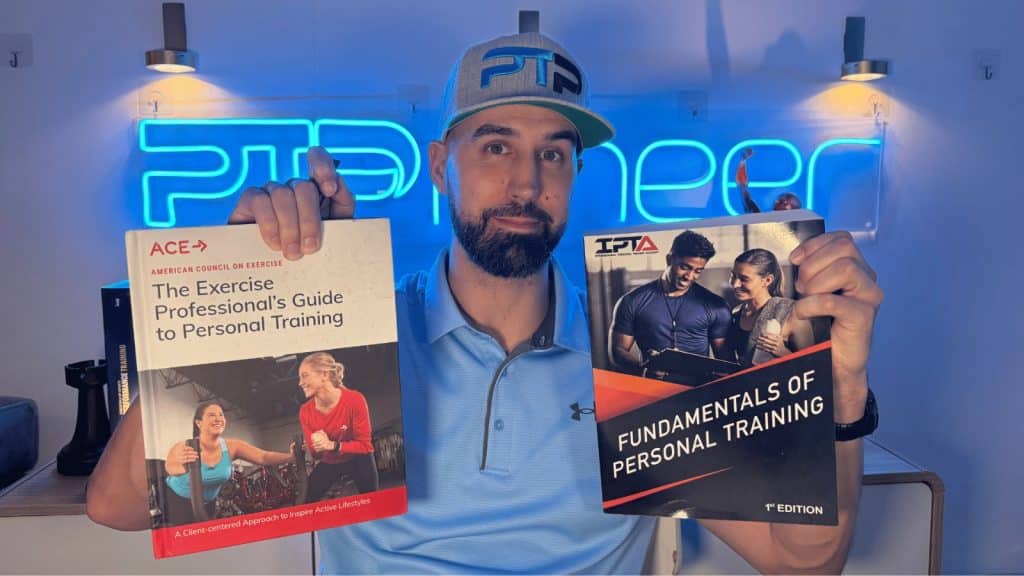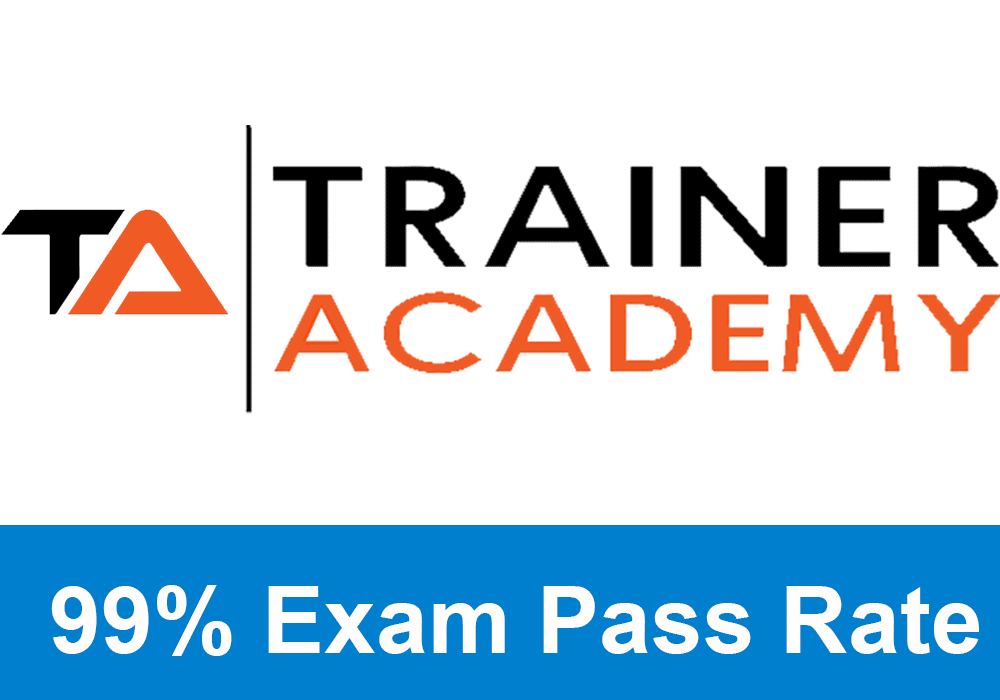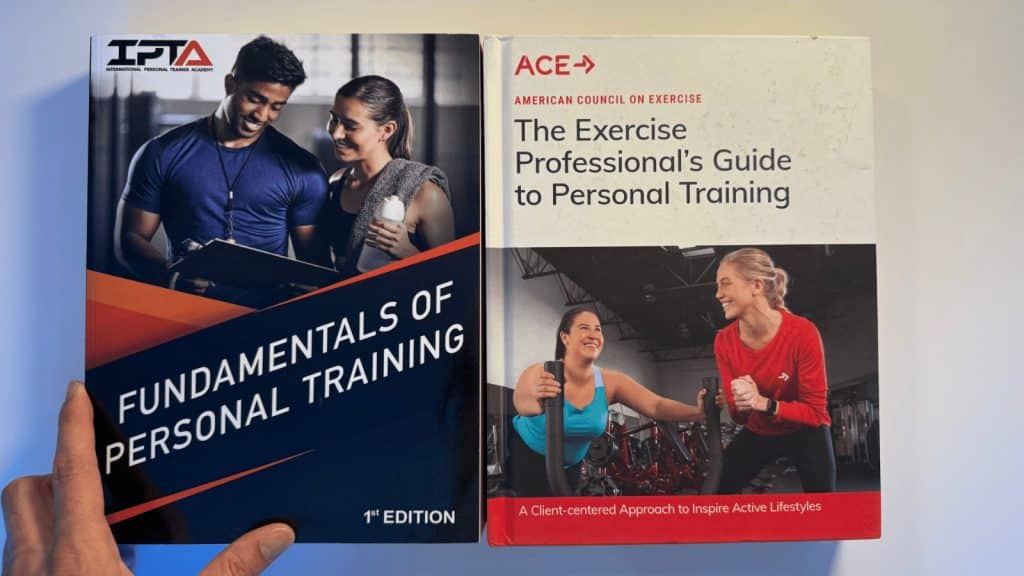
After completing both the IPTA and ACE CPT certification courses, the newer IPTA certification takes precedence over ACE. IPTA provides more value and is a significant step up from ACE. Read the review below to see the differences between ACE and IPTA.
IPTA and ACE Quick Comparison
| CPT | Features | Price |
|---|---|---|

|
✔ Modern, tech-driven study tools (AI, flashcards, mnemonics) ✔ Job guarantee included in higher tiers ✔ Affordable, NCCA-accredited by default ✔ Free first recertification ✔ Fast average completion time |
View on IPTA Website |

|
✔ Offers accredited and non-accredited exams ✔ Focus on behavior change and motivation techniques ✔ Flexible, self-paced online study options ✔ Large network of certified professionals and CEU resources ✔ Less expensive than NASM or ISSA |
View on ACE Website |
Choosing the right personal training certification can shape your entire fitness career. Two of the top contenders in today’s market are the International Personal Trainer Academy (IPTA) Certified Personal Trainer (CPT) program and the American Council on Exercise (ACE) Certified Personal Trainer (CPT) certification.
Both are respected options, but they differ in cost, structure, learning experience, and long-term career value. This guide compares IPTA and ACE across every major category — including exam difficulty, study materials, pricing, and career outlook — to help you decide which certification best fits your goals.
Use the code PTPFEBRUARY to receive between 35% and 50% (depending on the program) off the Trainer Academy MVP Study System. Get the trial for any of their study systems here and look at my review for Trainer Academy here.
For more tips on which CPT is best for you, please take the quiz to determine which PT certification is the right fit.
Now, let’s dive in and see how the certifications and their companies compare, starting with the IPTA.
What is the IPTA CPT Certification?

The IPTA Certified Personal Trainer certification was developed to modernize the process of becoming a personal trainer. Unlike many traditional programs that rely heavily on dense textbooks and independent study, IPTA focuses on an adaptive, tech-driven learning experience.
Students are provided with a digital textbook, interactive flashcards, audio lectures, mnemonics, exam simulators, and AI-based tools such as SurePass AI, which analyzes quiz performance to identify weak points and optimize study efficiency. The platform also integrates spaced-repetition techniques and weak-point training modules to improve retention and confidence heading into the exam.
The IPTA CPT program covers all essential domains of fitness education — including anatomy, physiology, client assessment, program design, exercise technique, and professional conduct. The exam includes approximately 135 questions over a three-hour period and is structured to test both scientific knowledge and practical application.
Another key strength of IPTA is its affordability. With study packages typically starting at around $399 and offering free recertification, free CPR/AED certification, and even a free textbook, IPTA provides exceptional value. Periodic Buy-One-Get-One (BOGO) offers — such as a free Nutrition Certification with CPT enrollment — further enhance its appeal.
In short, IPTA offers a modern, accessible, and affordable certification experience designed to help aspiring trainers succeed faster and with more confidence.
Exclusive PTP CPT Offers |
||
|---|---|---|
Best Overall Cert | Best Online Cert | Best Study Materials |
Gold Standard Cert | A Good Option | Best CPT for you?  |
What is the ACE CPT Certification?

The ACE Certified Personal Trainer program, offered by the American Council on Exercise, is one of the most recognized certifications in the world. ACE has been a nonprofit leader in the fitness industry for decades and is known for its emphasis on science-backed education, professional credibility, and public health advocacy.
The ACE CPT curriculum is centered on evidence-based training principles, client behavior change, and functional movement. Students learn how to design safe and effective exercise programs while also mastering client communication, motivation, and lifestyle coaching strategies.
ACE offers two distinct exam pathways: a non-accredited open-book certificate exam and a proctored NCCA-accredited CPT exam. The accredited version — which most employers recognize — requires candidates to be at least 18 years old, hold a high school diploma or equivalent, and possess a valid CPR/AED certification with hands-on skills verification.
The ACE exam consists of 150 multiple-choice questions administered over a three-hour period. It has a reputation for being challenging, emphasizing applied knowledge and real-world scenarios. The ACE learning platform includes interactive study materials, live webinars, practice exams, and self-paced modules. While it offers excellent educational depth, ACE’s study packages tend to be more expensive, typically ranging from around $850 to $1,200 depending on the level of support and resources included.
IPTA vs ACE Prerequisites
Both IPTA and ACE have similar prerequisites, requiring candidates to be at least 18 years old, have a high school diploma or GED equivalent, and maintain a valid CPR/AED certification. However, the ACE certification has slightly stricter requirements for its accredited version, including a mandatory hands-on skills assessment for CPR/AED.
IPTA’s prerequisites are straightforward and designed for accessibility, allowing students to begin studying immediately after enrollment. ACE’s process, on the other hand, may require scheduling with an approved proctor and verification of CPR/AED certification before sitting for the exam. While these differences are subtle, they reflect each organization’s overall philosophy — IPTA emphasizes flexibility and accessibility, while ACE prioritizes traditional structure and procedural rigor.
.
IPTA CPT vs ACE CPT Pros and Cons

Cost and Value
When it comes to affordability, IPTA clearly leads. Its base certification package typically costs less than half of ACE’s standard offering and includes an impressive range of bonuses — such as free recertification, a digital textbook, and optional CPR/AED certification. In some cases, IPTA’s BOGO deals allow students to earn two certifications for the price of one, giving them a strong competitive edge when entering the job market.
ACE, while significantly more expensive, commands higher recognition in many commercial gym settings. Employers often trust the ACE name due to its long-standing reputation and NCCA accreditation. For those who can afford the higher cost, the ACE certification can serve as a powerful credential in both corporate fitness and private training settings.
The IPTA base cost is $399 while ACE is $587. These reflect the current prices while sale, because ACE normally costs $979 for the lowest package.
Ultimately, IPTA provides exceptional value for budget-conscious students, while ACE delivers strong brand recognition and an established reputation.
IPTA vs ACE Study Materials and Learning Experience
Where these two certifications diverge most is in how they approach learning. IPTA has reimagined the study experience with a focus on modern educational psychology and technology. Its digital study system includes flashcards, mnemonics, quizzes, and an adaptive AI-driven exam simulator that mimics the real testing environment. This system helps students study efficiently, reducing time spent on concepts they already know and reinforcing weaker areas. The result is a shorter learning curve and improved exam readiness.
ACE, in contrast, offers a more traditional academic model. Its online platform is comprehensive and professional, featuring videos, textbook readings, and case studies that align closely with its behavior-change-centered philosophy. However, the ACE learning experience can feel more textbook-heavy and may require more self-discipline, especially for students choosing the lower-cost study packages. The higher-tier packages add valuable resources like live study groups, instructor guidance, and extended exam retake support, but at a higher price point.
Overall, IPTA appeals to learners who value interactivity, gamified studying, and efficiency, while ACE remains ideal for those who prefer an established, research-oriented approach with a long history of success.
Accreditation
IPTA only offers an NCCA-accredited exam. This is the exam you’ll want to take anyways as the non-accredited version isn’t accepted by most reputable employers.
ACE offers both accredited and non-accredited versions of its CPT. While this does offer you the option of an open-book exam, it’s not really an option at all in my book. Part of the reason employers want a certified trainer is because of the rigor that comes from someone truly learning the knowledge they’ll need on the job. With an open-book exam, you can always refer to the textbook for answers. This doesn’t mean you don’t need to know the information, it’s just a much less demanding test and that’s why NCCA-accreditation exists.
Both NCCA-accredited exams from IPTA and ACE have around a 75% pass rate, but the non-accredited exam from ACE has a 90% pass rate.
While the IPTA exam is harder (the accredited version), you do get free retakes with IPTA, which is nice for anyone worried about the exam.
Career Support and Perks
IPTA wins out on the perks section because they offer: a free textbook, CPR/AED, Job Guarantee, SurePass AI, Free Recertification, Pass Guarantee, and their BOGO offer, which includes the IPTA Certified Nutrition Specialist.
Long-Term Career Growth
Career potential is where ACE and IPTA take different but equally valuable paths. The ACE certification benefits from decades of brand recognition, making it one of the most trusted credentials in the world. This can open doors to employment at major gyms, corporate wellness programs, and health clubs that prefer established NCCA-accredited certifications. ACE also offers a wide range of continuing education opportunities, including advanced credentials in health coaching, behavior change, and group fitness instruction, which can help trainers expand their expertise over time.
The IPTA certification, while newer, is rapidly gaining popularity due to its innovative learning model, strong educational foundation, and unbeatable value. Many trainers find that the practical emphasis of the IPTA CPT program translates quickly into real-world success, and the included recertification and bonus course options make it easy to continue growing without recurring costs.
In the long term, ACE’s broader ecosystem of specialty certifications may offer more traditional pathways for advancement, while IPTA’s modern focus on technology, AI tools, and efficiency positions it as a forward-thinking option for the next generation of trainers.
Which Exam Is Harder: IPTA or ISSA?
If comparing the accredited versions of both exams, ACE is often considered slightly more difficult due to its greater emphasis on applied client scenarios and the depth of its behavior-change content. The IPTA exam, while still rigorous, is designed to be more approachable, with clear testing objectives and a study system built to mirror the actual exam format.
However, if comparing the non-accredited open-book ACE exam with IPTA’s NCCA-accredited version, IPTA’s exam is unquestionably more challenging and professionally respected. For those pursuing legitimate employment in gyms or institutions, the accredited path should always be the target.
In summary, the IPTA CPT exam may be easier to pass because of its modern study system, but ACE’s longer-standing reputation and slightly higher academic demands give it an edge for those seeking maximum credibility.
Bottom Line and Recommendation
Both the IPTA CPT and ACE CPT certifications are credible, respected, and capable of helping you launch a successful fitness career. The choice ultimately depends on your priorities.
If you’re looking for an affordable, accessible, and tech-driven program that emphasizes practical learning and offers outstanding value, IPTA is the clear winner. It delivers a modern learning experience and tangible bonuses like free recertification and CPR training, all at a fraction of the cost of competitors.
If you prefer a more traditional route with decades of proven credibility and broad industry recognition, ACE remains one of the most established options in the world. Its comprehensive coursework and wide network of certified professionals make it ideal for those pursuing long-term growth in various health and fitness roles.
In simple terms: IPTA offers the best value for new trainers entering the field, while ACE provides long-standing credibility for those seeking an industry-standard credential. Both can lead to rewarding careers, but IPTA’s innovative, cost-effective model is quickly redefining what modern personal training certification can look like.

 Have a question?
Have a question? 
Tyler Read
PTPioneer Editorial Integrity
All content published on PTPioneer is checked and reviewed extensively by our staff of experienced personal trainers, nutrition coaches, and other Fitness Experts. This is to make sure that the content you are reading is fact-checked for accuracy, contains up-to-date information, and is relevant. We only add trustworthy citations that you can find at the bottom of each article. You can read more about our editorial integrity here.